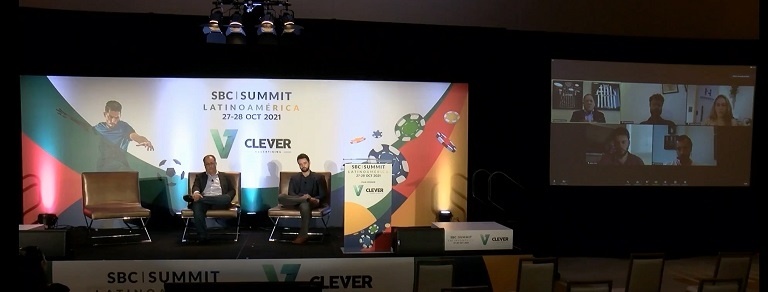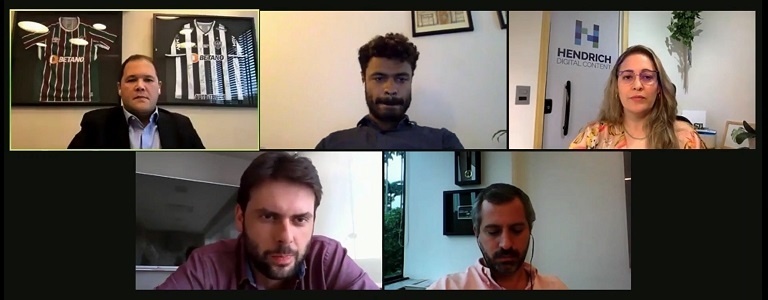

In all respects, Brazil is a great reference as the last important barrier to be reached in the gaming area, but sports betting, which is already a reality in the country, led to an interesting panel at SBC Summit Latinoamérica, which discussed the strong impact of sponsorship on tis vertical in Brazilian football. The issue of regulation was widely commented on and Gustavo Guimarães, from SECAP, guaranteed that it will be released “before World Cup 2022.”
The panel “The new era of sponsorship in Brazilian football” was moderated by Luiz Alberto D'Avila Araújo, from the Department of Evaluation and Lotteries of the Ministry of Economy (SECAP), and the speakers were Alex Fonseca (National Manager of Betano for the market Brazilian), Fernando Paz (sponsorship fundraising consultant), Gustavo Guimarães (Secretary of Evaluation and Lotteries at SECAP), Luciana Hendrich (Hendrich Digital Content), Pedro Melo (CCO Atlético Mineiro) and Maurício Amaro (Website Manager at ALTS Digital) .
Gustavo Guimarães, Secretary of the Ministry of Economy's Secretariat for Evaluation and Lotteries, said he is working to create the future. “We have a legal sports betting process in Brazil, but it depends on regulation. We knew that the 2018 law needed adjustments, especially regarding taxation. Today, the country is competitive at this point and we have very fertile ground to develop the sector a lot. Our goal is to deliver the regulations as quickly as possible, without waiting for the deadline.”
“We want to deliver well before the end of 2022 the proper regulation to foster the sports betting sector. We’ll surprise everyone about that. We will have a year of the World Cup with a lot of light for the activity and this will be a milestone for SECAP as a regulatory body,” guaranteed Guimarães.

“The return of regulation will not only be for sports and bookmakers, but also for the social destinations that the activity will generate. We want to create the link between the sector's growth and the improvement of public finances and how resources will be directed to areas that will be demanding in the coming years. Prejudice still exists, but it is important to show that the activity is legal. We will regulate and attract, creating all the potential that all of you have shown here,” said the Secretary, ending with the statement that regulation will come “before World Cup 2022.”
Pedro Melo, from Atlético Mineiro, says that the arrival of sports betting companies completely changed the sponsorship scenario for football: “It was just when we were looking for a new sponsor, which fit very well with the partnership that Betano was looking for, that led us to an excellent partnership.”
Atlético’s executive said that 2022 will be a year in which the sports betting market will grow even more. “New players should arrive in Brazil to compete in this market and I see this with good eyes, since the more companies, the better for the clubs and for the market itself. In the year of the World Cup, national football moves even more and 2022 will be the moment for the inauguration of our stadium,” he comments.
Melo commented that when deciding to sign a contract with Betano, he considered the company's high specialization and compliance with the rules required by the market. “Companies that come to the Brazilian market must follow the same path to obtain successful partnerships with Brazilian sport,” he said.
Alex Fonseca, from Betano, says that a sports betting company, when defining sponsorship by a football team, examines the club's scope and tradition. “In addition, we try to look at the club's management, which needs to be very professional and focused on development and evolution, which ends up being reflected in sports performance. When relating to a team, we expect seriousness and professionalism and how organized they are so that we can develop a sponsorship to its full potential,” he explained.
Even in other divisions, such as Brasileirão Serie B, it doesn't take away the value of a club, in Fonseca's assessment, and the activation potential is always taken into account. “We have Vasco da Gama and Cruzeiro, for example, in Serie B, which does not take away the merit of these two great clubs. They have immense activation potential, which is attractive to the sponsor. The club's product is its shirt and the more possibilities it opens up for using the shirt and players to activate the sponsor, this product becomes much more attractive, both for current and future sponsors.”
Boosting activations, according to the Betano executive, results in the club's appreciation for both the current and future sponsors. “The team's performance, for example, gives me the certainty that other sports betting companies would like to get into the shirt – I warn everyone that we have already renewed and the subject is closed – because it is always a satisfaction to be in the champion's shirt, without wanting to brag ahead of time. It is important to offer the sponsor activation possibilities that add value to the product and obviously value the sponsor's brand as well,” said Fonseca.

According to him, the Brazilian market, with the regulation, will have an exponential growth. “Today, it's the tip of the iceberg. Sponsorship is one of the main assets, but an operator cannot have its entire strategy focused on sponsorship. Betano has sponsorship in its DNA and currently sponsors 14 clubs around the world. I'm not aware of any other bookmaker – and even another type of industry – with so many sponsorships. In this regard, there is great potential in Brazil for the arrival of other bookmakers and sponsorship of football teams.”
Fernando Paz, who works in Copa do Brasil in the area of sponsorship, endorsed Fonseca's words: “We are a continent within South America. I see a very large growth in Brazil in relation to sports betting. Today, not only are football shirts sponsored, but all competitions are also sponsored. Sportooks want this segment and I cite the example of the Copa do Brasil, which has exclusivity per segment.”
“Today we have Sportsbet.io as a bookmaker present in the tournament, renewed until the 2022 season. We work the brand with several activations, not just brand exposure on the field displays. We want to add everything possible to convert into bets for Sportsbet.io,” commented Paz.
According to him, "the sponsored must work, as does the Copa do Brasil and the Copa do Nordeste, to give strength to the brands, in order to further enhance the sponsor's investment."
Luciana Hendrich commented that “before, an operator arrived in Brazil as one enters a dark room. I remember when we started with NetBet in 2017, because nobody wanted to accept a bookmaker as a sponsor. Today, this reality is different and many operators are highlighted in this scenario, which is no longer configured as a dark room.”
The lack of regulation, according to Maurício Amaro, is what still causes a little of this dark room, but the work of affiliates has reduced this characteristic: “Today, we try to show the legality of a bookmaker, even if there is no regulation itself, which has reduced the taboo against the activity and the understanding that they are an active economic sector.”
Hendrich added that on the operator's side, the lack of regulation involves the legal aspect. "Some operators have not arrived yet because they do not see legal certainty to invest in the country," she said.
Alex Fonseca also highlighted the importance of regulation for the generation of new jobs. “Today, we have 1,200 employees in three hubs around the world and with the regulation in Brazil, we could have 200 to 300 jobs at Betano. Everyone loses with an unregulated market,” he stressed.
Source: GMB